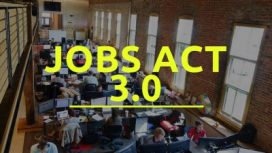 In a rare display of bipartisanship, the House of Representatives passed the JOBS and Investor Confidence Act of 2018, known as the JOBS Act 3.0 by a 406-4 vote. The legislation, which was the result of an agreement between House Financial Services Committee Chairman Jeb Hensarling (R-TX) and Ranking Member Maxine Waters (D-CA), includes a package of 32 bills which improve investment, capital formation and lending, with a specific focus on helping small business.
In a rare display of bipartisanship, the House of Representatives passed the JOBS and Investor Confidence Act of 2018, known as the JOBS Act 3.0 by a 406-4 vote. The legislation, which was the result of an agreement between House Financial Services Committee Chairman Jeb Hensarling (R-TX) and Ranking Member Maxine Waters (D-CA), includes a package of 32 bills which improve investment, capital formation and lending, with a specific focus on helping small business.
This important legislation includes provisions which ease securities laws to help small businesses attract investors and go public. Some of the highlights of the legislation, include:
- The Helping Angels Lead Our Startups (HALOS) Act (H.R. 79) addresses an important issue regarding when a business may make a pitch to potential investors without breaking securities laws. The legislation would define an “angel investor group” and modify SEC regulations to allow entrepreneurs seeking investment to make presentations to prospective investors at events sponsored by angel investor and venture capital groups, nonprofit organizations, universities, etc.
- The Fair Investment Opportunities for Professional Experts Act (H.R. 1585) would update the definition of accredited investor so those who do not have a high income or high net worth but do have the education and job experience to evaluate investment risks and merits can participate via investments in the growth of promising companies.
- The Investing in Main Street Act (H.R. 2364) increases the percentage a financial institution or federal savings association can invest in a small business investment company (SBIC) from 5 percent to 15 percent.
For a full list of bills included in the JOBS Act 3.0, click here.

 If you are an entrepreneur seeking capital, the path to venture funding could be getting a little easier. Earlier this month, the House Financial Services Committee took action on two bills that make venture investments more attainable for entrepreneurs –
If you are an entrepreneur seeking capital, the path to venture funding could be getting a little easier. Earlier this month, the House Financial Services Committee took action on two bills that make venture investments more attainable for entrepreneurs –